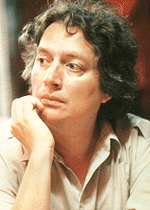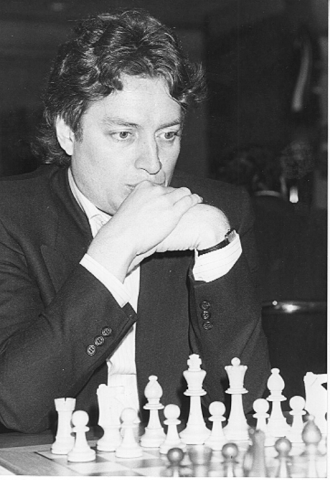Timman Jan Hendrik (14.12.1951)
 Dutch Grandmaster (1974). Nine times winner or shared the first prize in the Dutch Championship. Since 1974, he regularly took part in the Olympiads as a member of the National Team. Participated successfully and won the tournament in Wijk aan Zee in 1971, in 1972 at Stockholm, and in 1973 at London, but his first brilliant victory was at Hastings in 1973-74 when he finished equal first with Kuzmin, Szabo and Tal; later that year, he shared the victory with Gulko in Sombor. His outstanding career continued in Natanya in 1975 and in Reykjavik in 1976, where he shared the first prize with Olafsson; then followed brilliant victories in strong tournaments in 1978 in Niksic, tied with Gulko, in Amsterdam and in Nijmegen together with Sosonko and in Bled Portoroz in 1979. In 1979, he beat the super Soviet Champion L. Polugaevsky in Breda with the score 4,5-3,5. He played a great deal in the 1980s and showed his talent, participated in various tournaments: in 1980 he came in third at Bugojno behind Karpov, Larsen, ahead of Tal, at Tilburg he finished second, in Buenos Aires he was the second after Larsen. In 1981 in Wijk aan Zee, he shared the first prize with Sosonko and was also the winner in the Amsterdam Tournament, ahead of Karpov and Portisch, and in Las Palmas, ahead of Larsen and Korchnoi.
Dutch Grandmaster (1974). Nine times winner or shared the first prize in the Dutch Championship. Since 1974, he regularly took part in the Olympiads as a member of the National Team. Participated successfully and won the tournament in Wijk aan Zee in 1971, in 1972 at Stockholm, and in 1973 at London, but his first brilliant victory was at Hastings in 1973-74 when he finished equal first with Kuzmin, Szabo and Tal; later that year, he shared the victory with Gulko in Sombor. His outstanding career continued in Natanya in 1975 and in Reykjavik in 1976, where he shared the first prize with Olafsson; then followed brilliant victories in strong tournaments in 1978 in Niksic, tied with Gulko, in Amsterdam and in Nijmegen together with Sosonko and in Bled Portoroz in 1979. In 1979, he beat the super Soviet Champion L. Polugaevsky in Breda with the score 4,5-3,5. He played a great deal in the 1980s and showed his talent, participated in various tournaments: in 1980 he came in third at Bugojno behind Karpov, Larsen, ahead of Tal, at Tilburg he finished second, in Buenos Aires he was the second after Larsen. In 1981 in Wijk aan Zee, he shared the first prize with Sosonko and was also the winner in the Amsterdam Tournament, ahead of Karpov and Portisch, and in Las Palmas, ahead of Larsen and Korchnoi.
In 1982, he won the strongest tournament in Mar del Plata, and came in the second in Tilburg behind Karpov. He drew a match in Hilversum with Korchnoi and that year, his ELO rating was the third in the top ten players’ list. In 1984, he was the winner of the very strong tournament in Bugojno, and in 1985, in Wijk aan Zee, followed by Nunn and Beliavsky, and Zagreb/Rijeka. In 1987, in Amsterdam he tied with Karpov, won Tilburg 1987 followed by Hubner and Nikolic, and in 1988, in Linares ahead of Beliavsky and Yusupov, in 1989 in Amsterdam followed by Short and Salov and at Rotterdam ahead of Karpov and Vaganian. He continued playing successfully: in 1990,he was the winner in Prague, in 1991 in Paris, in the Amsterdam Donner Memorial in 1995, he shared the first place with Granda, in 1997, shared a victory with Van Wely in Merriville, and in 1998, in the Frankfurt Masters Tournament, he finished equal first with Beliavsky. Having been the fourth in the Montpellier Interzonal 1985 and having won a tie-break with Tal, he became a Candidate but could not reach the finals because of an unexpected loss to Yusupov in the semi-finals match; later, he lost an exhibition match with Kasparov with a score +1=4-4. He played two friendly matches in 1987 in Hilversum, one with Ljubojevic, which he won with a score 4,5-1,5, and another with Tal, he lost with a score 3,5-2,5. Being a Candidate again in 1988, he won the first stage match vs Salov +1=4. In the quarter-finals in 1989, he beat Portisch 3,5-2,5, and in London for the semi-finals match, he defeated Speelman –4,5-3,5, but the following year in Kuala –Lumpur, he lost in the final stage to Karpov- 6,5-2,5. In the next Candidates Cycle in 1991, he beat Hubner with a score 4,5-2,5, then won a match with Korchnoi, scoring +2=5. The same year, he played a friendly match with Ivanchuk and lost 3,5-2,5. In 1992, he won the quarter-finals stage of the Candidates vs Yusupov +4=4-2, and got the right to meet with Short in the finals, which he lost. Following the withdrawal of Short and Kasparov from the FIDE Cycle, he got a chance to play Karpov for the FIDE World Championship final. The following year in Zwolle/Arnhem/Amsterdam/Jakarta, he lost a match with Karpov –12½-8,½. Later in Corfu, he lost another match vs Skembris with a score of 3-1. He returned to the FIDE cycle, and in 1994 in Wijk aan Zee, he won the first stage vs Lautier 4½-3½. In 1995 in Amsterdam, he lost to Nikolic –2½-1½, and in 1998 in Breda, he drew a match with Van Wely. In 2005, he beat Bruzon 5-3. As many other chess players he had his downs as well as his ups- he was last at Belfort in 1988 and in March 1988 in Amsterdam. An energetic player, very well theoretically prepared with an attacking play, he often lost a good position because, as Dvoretsky said: “He doesn’t have a feeling for the danger.” However, everyone considers him to be the worthy successor of the World Champion Dr. Max Euwe. In the 1980s and early 1990s, he was well known in Holland and throughout the world, being the strongest non-Russian player, once having reached the third place in the ELO rating list. Together with Euwe, he wrote the book De Tweekamp Spasski-Fischer (1972) and then published Art of Analyses and Schaakwerk. Was co-editor of the Dutch magazine Schaakbullet in in the 1980s and co-editor-in-chief of the acclaimed magazine New in Chess.






